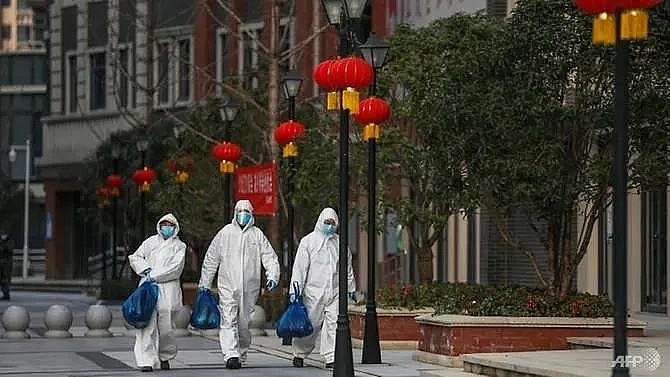China reports no new domestic COVID-19 cases for first time, but 34 imported
 |
| Many residents in the virus-hit city of Wuhan, China, are depending on online group-buying services to get food AFP/STR |
The lack of domestic infections marks a major milestone in China's containment efforts, but the rise in imported cases threatens to unravel its progress.
The National Health Commission said there were 34 more cases brought in from abroad, the biggest daily increase in two weeks, with 189 in total now.
Of the 34 imported infections, Beijing accounted for 21 cases, a daily record for the city.
There were no new cases in Wuhan - the central city where the virus first emerged in December - for the first time since authorities started publishing figures in January, according to the National Health Commission.
Wuhan and its 11 million people were placed under strict quarantine on Jan 23, with more than 40 million other people in the rest of Hubei province entering lockdown in the following days.
The rest of China also enacted tough measures to limit public gatherings.
Eight new deaths were reported in China as of the end of Wednesday, all from Hubei province, taking the country's death toll to 3,245.
A total of 80,928 people have now been confirmed to have the disease in China.
On Mar 10, President Xi Jinping visited Wuhan for the first time since the outbreak began and declared that the spread of the disease was "basically curbed".
On the same day, Hubei officials allowed people to travel within the province for the first time since January, excluding Wuhan.
On Wednesday, Hubei authorities announced they were partially opening its borders to allow healthy people from low-risk areas to leave the province if they have jobs or residences elsewhere. This also excludes Wuhan.
Life has slowly started to return to normal in the rest of the country, with people back at work, factories up and running, and schools in some regions resuming or preparing to go back to class.
SECOND WAVE
But there is concern about a second wave of infections due to an influx of cases from abroad, with an average of 20,000 people flying into China every day.
Beijing and other regions are now requiring most international arrivals to go into 14-day quarantine in designated hotels.
"We should never allow the hard-won and continuous positive trend to be reversed," Xi said at a Communist Party leadership meeting on Wednesday.
The disease is believed to have jumped from an animal to humans at a market that illegally sold wild game in Wuhan late last year.
There have also been questions about China's official figures, as authorities changed its methodology to count infections, and the government has endured rare public criticism of its handling of the health emergency.
Local officials initially attempted to cover up the outbreak, with police silencing doctors who had raised the alarm about the emergence of the new virus as early as December.
One of the whistleblowers, Wuhan ophthalmologist Li Wenliang, died from the virus himself in February, sparking an outpouring of grief and anger on social media.
The first case emerged in Wuhan on Dec 1, according to Chinese researchers, but it was not until Jan 9 the country confirmed a "new type of coronavirus".
Between Jan 5 and 17, China reported no new cases of the virus, even as Japan and Thailand declared first infections - a period that coincided with annual political meetings in Wuhan and Hubei province.
What the stars mean:
★ Poor ★ ★ Promising ★★★ Good ★★★★ Very good ★★★★★ Exceptional
 Tag:
Tag:
Themes: COVID-19
- 67 million children missed out on vaccines because of Covid: UNICEF
- Vietnam records 305 COVID-19 cases on October 30
- 671 new COVID-19 cases recorded on October 1
- Vietnam logs additional 2,287 COVID-19 cases on Sept. 21
- People’s support decisive to vaccination coverage expansion: official
Related Contents
Latest News
More News
- Russian President congratulates Vietnamese Party leader during phone talks (January 25, 2026 | 09:58)
- Worldwide congratulations underscore confidence in Vietnam’s 14th Party Congress (January 23, 2026 | 09:02)
- Political parties, organisations, int’l friends send congratulations to 14th National Party Congress (January 22, 2026 | 09:33)
- 14th National Party Congress: Japanese media highlight Vietnam’s growth targets (January 21, 2026 | 09:46)
- 14th National Party Congress: Driving force for Vietnam to continue renewal, innovation, breakthroughs (January 21, 2026 | 09:42)
- Vietnam remains spiritual support for progressive forces: Colombian party leader (January 21, 2026 | 08:00)
- Int'l media provides large coverage of 14th National Party Congress's first working day (January 20, 2026 | 09:09)
- Vietnamese firms win top honours at ASEAN Digital Awards (January 16, 2026 | 16:45)
- ASEAN Digital Ministers' Meeting opens in Hanoi (January 15, 2026 | 15:33)
- ASEAN economies move up the global chip value chain (December 09, 2025 | 13:32)






















 Mobile Version
Mobile Version